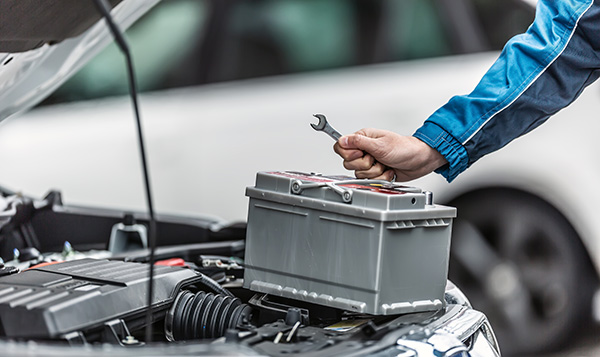
Winter mornings can be tough enough without the added frustration of a car that won’t start. In most cases, the culprit behind those chilly inconveniences is a failing battery. But why does winter take such a toll on car batteries? Understanding the reasons can help you avoid getting stranded and keep your vehicle running reliably through the colder months.
Batteries vs. Cold Weather
Car batteries work by converting chemical energy into electrical energy to start your vehicle. This chemical reaction depends on a fluid called electrolyte, which allows the movement of charged particles. However, when temperatures drop, the electrolyte thickens, slowing the chemical reaction and reducing the battery’s ability to generate power.
At 32°F, a fully charged battery loses about 20% of its capacity. At 0°F, it can lose up to 50%. This means the colder it gets, the harder it is for your battery to provide the power needed to start your car.
How Winter Strains Your Battery
- Increased Power Demand: Winter conditions often require more energy. Heating systems, defrosters, and windshield wipers demand extra power from your car, placing additional stress on the battery.
- Reduced Engine Efficiency: Cold weather thickens engine oil, making the engine harder to turn over. Your battery has to work extra hard to crank the engine, using up more energy in the process.
- Weakened Batteries Are Vulnerable: If your battery is old or already weak, it’s less capable of withstanding the added strain from cold temperatures. This is why many batteries fail during winter, even if they seem fine during warmer months.
Signs Your Battery Might Be in Trouble
While no one wants to face a surprise dead battery, there are warning signs to watch for as the temperature drops:
- Sluggish Start: If your car takes longer than usual to start, it’s a sign your battery is struggling.
- Dim Lights: Flickering or dimming headlights can indicate a battery that’s losing its charge.
- Dashboard Warning Light: Many cars have a battery warning light that illuminates if there’s a problem with the charging system.
- Corrosion: Check your battery terminals. Corrosion can disrupt the flow of electricity and worsen in cold, wet conditions.
Tips to Prevent Winter Battery Failure
To keep your battery in top shape during winter, a little preventive care goes a long way. Here’s what you can do:
- Test Your Battery Regularly: A simple battery test can reveal whether it has enough charge to handle the winter months. Many auto repair shops offer this service.
- Keep Your Battery Clean: Dirt and corrosion on the terminals can drain your battery’s charge. Clean the terminals and ensure the connections are tight.
- Park Indoors: Whenever possible, park in a garage to shield your car from extreme cold. Even a slight increase in temperature can make a big difference for your battery.
- Avoid Short Trips: Frequent short drives don’t give your alternator enough time to recharge the battery. Try to drive longer distances occasionally to keep the battery charged.
When Is It Time for a New Battery
Most car batteries last three to five years. If yours is nearing the end of its lifespan, winter may push it past its limits. Pay attention to any warning signs, and don’t hesitate to replace the battery if needed. A reliable battery can save you from inconvenient breakdowns and costly towing services.
Why Winter Battery Care Matters in Bakersfield, CA
While Bakersfield, CA, may not experience the brutal cold of other regions, winter nights can still dip into temperatures that affect your car’s battery performance. Combined with occasional wet conditions, even milder winters can be tough on your vehicle. A little preparation and care go a long way in keeping your car reliable during these months.
Don’t let a failing battery ruin your winter plans! Visit Circle M Tire & Automotive in Bakersfield, CA, for expert battery testing, maintenance, and replacement services. Call us today to book an appointment!